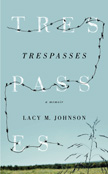 Trespasses
TrespassesBy Lacy Johnson
University of Iowa Press, 2012.
$19.95, 139 pages.
Cornhusker. Cletus. Hillbilly. Honky. Redneck. White Trash. “We are not that,” says Lacy Johnson’s unconventional memoir Trespasses, which documents how race, gender, and class shape collective identity
in the rural Midwest. The book reads as a family diary might — a braided series of poignant vignettes woven together with the thread of place. Johnson’s tone, technique, and voice vary with each microchapter
as she shuffles between subjects, jumping back and forth in time, momentarily pausing to shine a light here or there between three generations and two families. Her prose is languid and poetic, half memory, half dream. If the book had a soundtrack it would be one of rural ambiance — cicadas, lawn mowers, tractors flexing in mud, the soft whir of a metal fan, the creak of a floorboard underfoot.
Johnson wants to tell us the story of her family, a people who’ve spent the last 180 years in a single small Missouri county; but during a series of family interviews she finds at a certain point that “the facts got in the way of the truth.” Getting answers was difficult. “The silence can’t be broken. Or it can be broken, but not by asking questions. Not by asking them again in a different way. Not by telling stories about galvanized tubs, or blackberries growing wild along the fence line, or a bridge in the forest made entirely of fallen trees.” And so rather than merely chronicle, Johnson begins to shape-shift. By inhabiting the lives of her parents and grandparents, she lives into their experiences, trying to make sense of the impact a single day or moment can have on a family’s memory.
Johnson speaks to being marginalized as a poor, rural, white person — a “marked, racial, and degraded form of whiteness”— white trash. Growing up, Johnson wore homemade clothing. She knew she was poor, but she didn’t think of her family as being trashy in any way. Readers will agree. The people she depicts are hardworking, resourceful, and often unknowingly poetic. (Poetic too, that her roots are deep in Missouri, a state struck by its own identity crisis when the Civil War literally split it in two.) But Johnson’s own view was, and to a large extent still is, inconsistent with how others saw her. Even after earning a PhD and losing her accent, Johnson still struggles with determining who she is and where she belongs when a woman in the checkout line “who could be [her] grandmother” eyes her tattoos and pregnant belly, and mutters trash under her breath. Johnson wrote this book to help reconcile her own identity, for herself and for her children.
“You know, we can never start with a blank slate,” her new (and first) black friend confesses. “You and I can never start from scratch.” She is of course referring to a racial barrier, but Trespasses itself is a testament to how that statement is truly universal. The author has internalized her own genetic memory, childhood, and socioeconomic mark just as her parents have before her, just as the reader has, and all instincts and judgments are in part informed by this collective memory. No one ever truly gets a clean slate. You’d best make sense of where you came from. Johnson knows this, and succeeds.
— Kathleen Yale
No comments:
Post a Comment